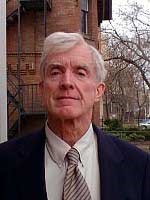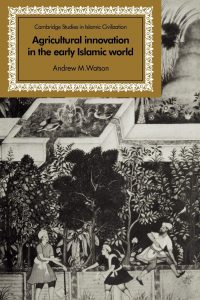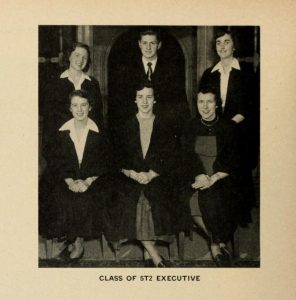
Professor Emeritus Andrew Murray Watson died on April 4, 2024. He was 93. A professor of Economic History, Watson was affiliated with the Department of Economics and Trinity College, where he was Emeritus Fellow, throughout his career with the University of Toronto.
While Watson retired in 1995, he taught until at least 2005 and completed his last academic assignment, a chapter for The New Cambridge History of Islam titled “Rural life and economy until 1800” at the age of 80.
After that, “he decided it was time to say goodbye to academia and joyously devote himself solely to travel, adventure, and the enjoyment of the good company of his friends spread round the world. Which he did and did well,” his family said in his obituary. “Amongst his many adventures in his 80s, he explored ancient grave sites in the Gobi Desert, and acted as guide for tours along the Silk Road. For over thirty years he spent the better part of his winters at an old palace in Bali where the staff treated him as an honoured uncle.”

Watson has left a lasting legacy to the field of Economic History. In 1974, he published the paper, “The Arab Agricultural Revolution and Its Diffusion, 700-1100” in the Journal of Economic History. The paper became the basis of the 1983 book Agricultural Innovation in the Early Islamic World: The Diffusion of Crops and Farming Techniques, 700–1100. The volume and paper are still widely cited, and Watson is recognized as the first to make arguments about the role of the spread of Islam, coupled with agricultural innovations, in the economic transformation of the medieval world.
“He wrote that an influx of new summer crops, introduced by the Arabs from the tropical climate of the Indian subcontinent into areas that had previously been dominated by winter crops, dramatically altered the agricultural and economic situations of the lands in their control, eventually impacting European economies as well,” wrote Anna Kelly in By Land or by Sea: Tracing the Adoption of Cotton in the Economies of the Mediterranean, chapter 11 of the text Transmitting and Circulating the Late Antique and Byzantine Worlds.
In 2014, Paolo Squatriti, Professor of History at the University of Michigan, published “Of Seeds, Seasons, and Seas: Andrew Watson’s Medieval Agrarian Revolution Forty Years Later” in the Journal of Economic History (Vol. 74, No. 4). On the event of Watson’s death, the Department of Economics asked Professor Squatriti to comment on Watson’s legacy fifty years in:

“As to his scholarly legacy, I’d say that it is immense and growing, in the fields of medieval history, agrarian history, Mediterranean history, and even in postclassical archaeobotany, a field that did not exist yet when he made his contributions to it, between about 1974 and 1990,” Squatriti wrote in an emailed statement. “Watson’s insight was that the dry and arcane Islamic agronomical manuals of the Middle Ages were far more interesting and revealing than anyone else supposed. On the basis of these texts, he recreated a history of botanical transfer from eastern to western Mediterranean under the aegis of the Abbasid Caliphs, mostly in the tenth and eleventh centuries. His reconstruction proved visionary, because the reinvigorated Mediterranean studies of the twenty-first century rediscovered it and has been using it as a model for a good 15 years. The new archaeobotanically-informed studies tend to try to prove Watson wrong about this or that detail, or to show that this or that plant did not move from Asia to Europe as Watson had postulated, but in their revisionism such studies take off from Watson’s primary idea, that plants have a history that is dynamic, that plants move, and their movements make a difference to economies, cultures, and social structures. In that sense Watson’s 1970s studies were tremendously ‘ahead of their time’ (an expression I am sure he detested), prefiguring the multi-species historical agency that environmental historians prefer today. That a trained specialist in development economics moved so seamlessly into historical debates at all is a tribute to Watson’s intellectual versatility, and that he had such a big impact is another testament to his originality as a thinker.”
Born in 1930 to Amy (nee Reid) and Daniel Watson, Professor Watson was, like his mother, a graduate of Trinity College. He completed his B. Comm in 1952 and his MA in 1953 before going to Oxford as a Rhodes Scholar. Later, he attended the University of Paris and studied Arabic at the University of Cairo. He received his appointment to the University of Toronto in 1957.
Predeceased by his parents, his brother Hugh and sister Barbara, Professor Watson is survived by his nieces Janet Bell of Ottawa and Gail Lampinen of Sacramento, their families, and by countless friends.
Return to the Department of Economics website.
Scroll more news.
